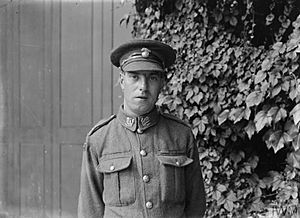Ernest Sykes (VC) facts for kids
Quick facts for kids
Ernest Sykes
|
|
|---|---|

Sykes, between 1914 and 1918
|
|
| Born | 4 April 1885 Mossley, Greater Manchester, England |
| Died | August 3, 1949 (aged 64) Lockwood, West Riding of Yorkshire |
| Buried |
Woodfield Cemetery, Lockwood
|
| Allegiance | |
| Service/ |
|
| Years of service | 1915–1918 |
| Rank | Private |
| Unit | Duke of Wellington's Regiment Northumberland Fusiliers Home Guard |
| Battles/wars | World War I World War II |
| Awards | Victoria Cross |
Ernest Sykes (4 April 1885 – 3 August 1949) was a very brave English soldier. He received the Victoria Cross (VC), which is the highest award for courage. This special medal is given to soldiers who show amazing bravery when facing the enemy. It is awarded in Britain and to forces from the Commonwealth.
Contents
Ernest Sykes's Bravery in World War I
Ernest Sykes was a Private in the British Army. He was 32 years old during the First World War. On April 9, 1917, near Arras, France, he showed incredible bravery.
A Heroic Rescue Mission
His army group was trying to advance but was stopped. They faced heavy gunfire from all sides. Many soldiers were hurt. Private Sykes, even with all the dangerous gunfire, went forward. He brought back four wounded soldiers to safety.
He then went out a fifth time. It seemed like he would surely be killed. But he stayed out there to help others. He bandaged all the soldiers who were too badly hurt to be moved. These brave actions, done under constant machine gun and rifle fire, showed he had no fear of danger.
His Victoria Cross Award
Because of his amazing actions, Ernest Sykes was given the Victoria Cross. The official message about his award said: "Private Ernest Sykes showed the most outstanding bravery and dedication. His group was stopped by heavy fire and had many casualties. Private Sykes went forward and brought back four wounded soldiers. He then went out a fifth time and stayed there, even though it seemed like certain death. He bandaged all those who were too badly hurt to be moved. These brave actions, done under constant machine gun and rifle fire, showed he had no fear of danger."
Service in World War II
Later, during the Second World War, Ernest Sykes continued to serve. He joined the 25th Battalion West Riding Home Guard.
Today, his Victoria Cross medal is on display. You can see it at the Fusiliers Museum of Northumberland in Alnwick, England.
How Ernest Sykes Was Remembered
Ernest Sykes's bravery was honored in several ways.
Train Named in His Honor
In 1920, a railway company named a train after him. It was called 'Private E. Sykes, V.C.' This train was later rebuilt in 1933. It kept his name until it was taken out of service in 1962. The special brass nameplate from the train is now at the Northumberland Fusiliers' Museum.
Blue Plaques
Ernest Sykes is also honored with two blue plaques. A blue plaque is a special sign that marks a place where a famous person lived or worked.
- In 1996, a blue plaque was put up in his hometown of Mossley, Greater Manchester. It is at the George Lawton Hall.
- In 2004, a second plaque was placed at his workplace. This was at the Mossley railway station.

